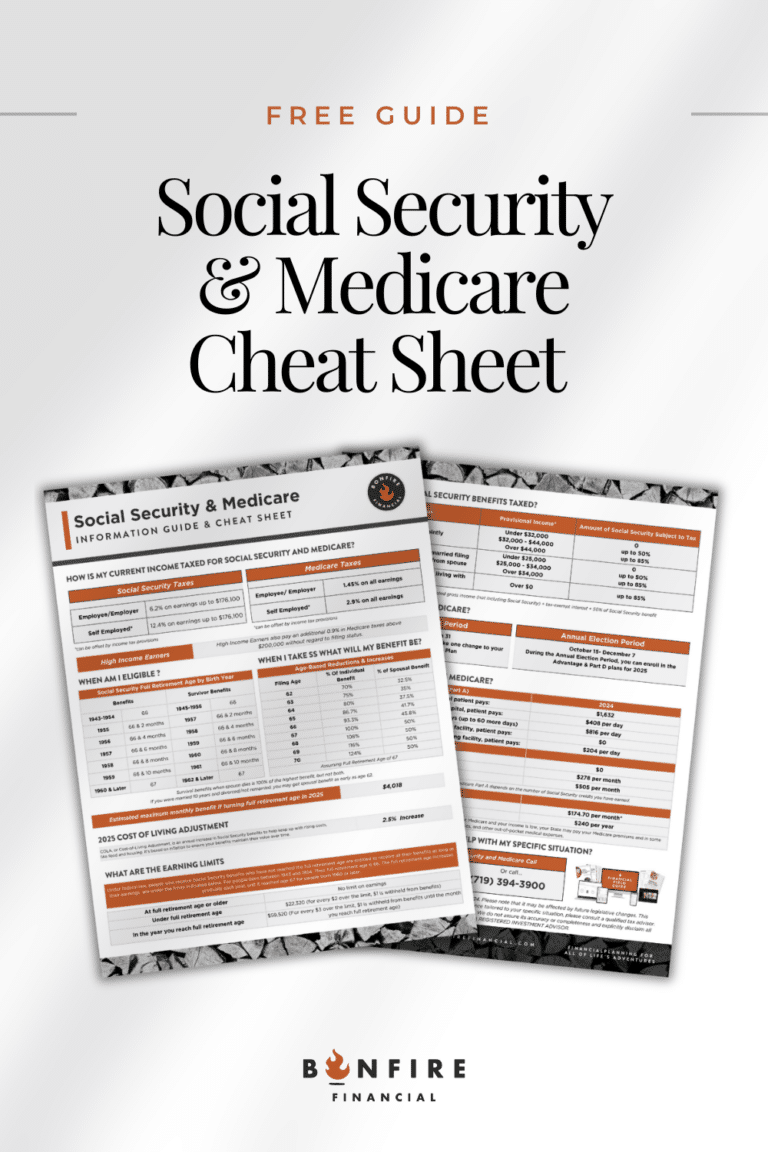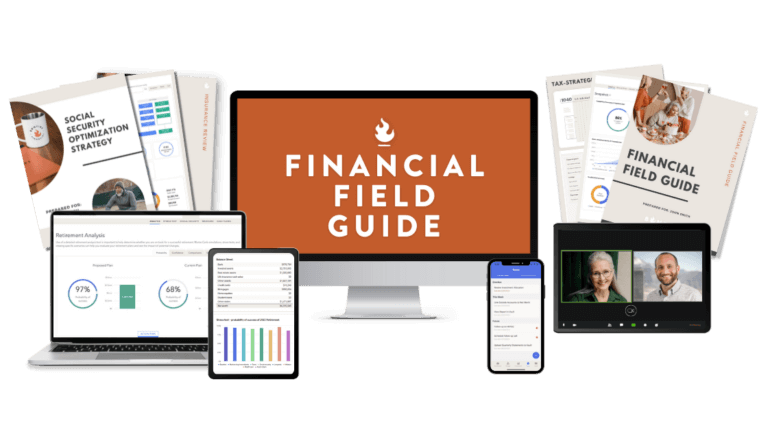Living for Today
“Live for today.” It’s a popular phrase, often used to justify a spontaneous purchase, a once-in-a-lifetime trip, or even just a splurge on a fancy dinner. But when you’re trying to plan for the future, that mindset can feel risky. So, how do you walk the line between enjoying life now and being responsible about your future?
In this post, based on insights from our recent episode of The Field Guide, we explore what it really means to live for today while still planning for tomorrow. We break down why the balance is more of an art than a science, how risk tolerance and personal experience shape financial choices, and ways to build a plan that supports both joy and security.
Listen Now: iTunes | Spotify | iHeartRadio | Amazon Music
The Myth of the Perfect Equation
Too often, financial advice is reduced to formulas: save X% of your income, invest in Y, and you’ll be fine. But that one-size-fits-all approach rarely works. Why? Because everyone has a different comfort level, past experience, and vision for what makes life fulfilling.
What makes one person feel secure could leave another anxious. For example, traditional advice suggests keeping three to six months of expenses in an emergency fund. But if you lived through a financial crisis, lost a business, or faced long-term unemployment, that might not feel like enough. You might want a year or more of expenses in cash. And that’s okay.
Financial planning must account for human nuance. It has to be personal. That means accepting that your version of “right” might not look like anyone else’s and putting aside the fear of missing out. Instead of seeking a perfect algorithm or rigid formula, the real strategy lies in flexibility, adjusting as your life, income, goals, and even the economy change.
What It Means to Live for Today
Living for today isn’t about reckless spending. It’s about aligning your financial choices with what brings you meaning and joy. That could be:
- Taking a family vacation
- Learning a new skill or hobby
- Traveling to experience new cultures
- Hosting a big family reunion
- Attending a cooking class or enrolling in art school
- Starting a small side business based on passion
These experiences create memories and fulfillment that can never be duplicated. And while they might not offer a monetary return, their emotional ROI is priceless. Money is a tool, not the goal. The balance sheet is important, but it isn’t where life happens. No one wants to reach retirement with a full bank account but a list of regrets.
When you invest in experiences that feed your soul, the returns go beyond numbers. They improve mental well-being, strengthen relationships, and offer a sense of purpose. We believe in balance, not deprivation, read our perspective in Why the FIRE Movement is BS.
Your Lifestyle Is the Starting Point
When making spending decisions, always start with your lifestyle. If your current standard of living includes mid-range hotels and coach flights, that’s the baseline you should work from. It’s easy to fall into the trap of upgrading everything because “it’s a special occasion.” But if you can’t afford luxury in your everyday life, why stretch to afford it on vacation?
Instead of chasing someone else’s version of the good life, define your own. Choose experiences that truly resonate with you. If you hate wine, don’t waste your money on a vineyard tour in Tuscany. Do what you love, in a way that fits your means.
Your lifestyle should guide your choices and that includes how you travel, dine, shop, and even give. If you’re giving up your future stability to appear wealthier in the present, you’re not living for today. You’re borrowing from tomorrow. Use this as a guide when determining the best age to retire.
Timing Matters More Than You Think
We all assume we have time. Time to travel. Time to learn. Time to reconnect. But what if you don’t?
As we age, physical limitations, unexpected health issues, or just the demands of life can chip away at those opportunities. A dream trip put off for “someday” may not be possible when that day finally comes.
Living for today is also about recognizing the fragility of time. If there’s something meaningful you want to do, find a way to do it now, even if it’s on a smaller scale.
Even delaying by a few years can change your capacity to fully enjoy an experience. Climbing a mountain or hiking Machu Picchu might not feel as doable at 70 as it would at 50. Your energy, enthusiasm, and ability to embrace adventure evolve with time.
How to Spend Without Regret
Spending money isn’t bad. Overspending is. And often, regret doesn’t come from what we buy, but how we buy it.
Here are a few ways to spend without guilt:
- Plan ahead: Build the experience into your budget. Save for it in advance.
- Stay within your lifestyle: Enjoy what’s aligned with your means.
- Get creative: Use points, miles, and off-season deals.
- Focus on meaning: Choose experiences that deeply matter to you or your family.
Most people don’t regret the experiences they invest in. They regret the ones they missed.
Remember, spending isn’t just about dollars, it’s about values. Make sure your money is going toward things that truly reflect your priorities, not someone else’s expectations.
The Financial Foundation
Enjoying the present doesn’t mean abandoning your future. It means building a strong financial foundation that gives you the freedom to enjoy life today.
Make sure you:
- Max out retirement contributions (401(k), Roth IRAs, etc.)
- Keep a realistic emergency fund
- Manage excess debt wisely
- Invest consistently over time
- Pair CDs with your short-term goals to lock in higher rates safely, see our deep-dive on how CDs work
- Revisit your financial plan at least once a year
- Consider creating a “fun fund” for guilt-free spending
Think of it this way: responsible planning gives you permission to spend. When the basics are covered, you can enjoy your money guilt-free.
Conversations That Matter
If you’re unsure whether a big purchase or experience fits into your plan, talk to a financial advisor. Not to get permission, but to get clarity.
Sometimes you need a second set of eyes to say, “Yes, you can absolutely afford this. Here’s how.” Or, “Let’s find a smarter way to do it.” Either way, it helps eliminate the stress of guessing.
A great advisor doesn’t just manage your investments. They help you live the life you want with the resources you have.
These conversations matter even more when there’s uncertainty, market volatility, a job change, or a sudden windfall. Knowing how to navigate big shifts can be the difference between peace of mind and financial anxiety.
Your Values Should Drive Your Strategy
At the core of all good financial decisions are values. What do you care about? What kind of legacy do you want to leave? What makes you feel most alive?
When you base your plan around what matters most, it becomes easier to:
- Say no to things that don’t serve you
- Spend confidently on what does
- Adjust your goals when your life changes
Living for today means honoring those values now, not just someday.
Final Thoughts
Living for today doesn’t mean blowing your savings or ignoring the future. It means being intentional. It means knowing your priorities, staying within your lifestyle, and making room for experiences that bring you joy.
You worked hard for your money. It should work hard for you, not just someday, but today. Whether you’re planning your next trip, debating a big purchase, or just trying to feel less guilty about spending, remember this: You can’t take it with you. But you can make it count.
So spend wisely, plan boldly, and live fully.
Ready to build a plan that lets you live fully today and confidently into the future? Reach out to our team at Bonfire Financial. We’re here to help you find that sweet spot.
 Client Login
Client Login







